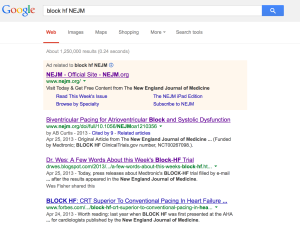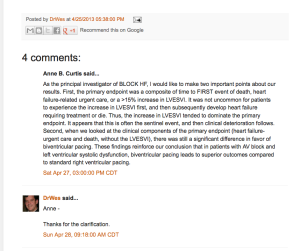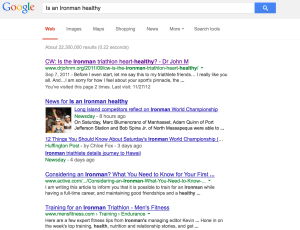I am going up to Indianapolis this Saturday to talk with a group of medical student leaders. I was asked to present on the role of social media.
Along these lines, I have to show you something that I found this morning. I was studying the FDA review panel’s evaluation of the Block-HF trial, when I came across these pictures. (Block-HF is a pacing trial that evaluates an expanded role of biV pacing. For the purposes of this post, the subject of the science is not important; it could be any sort of scientific inquiry.)
Upon Googling the words “block hf nejm,’ look what pops up.
Check out the second entry. That’s regular-working-stiff-doctor Wes Fisher writing an analysis on his blog. This is remarkable, and I think quite a disruptive concept. To read Wes’ useful analysis, one needs only an Internet connection. No subscription is required.
But it gets better with this next jpeg:
Wes’ first comment comes from Dr. Anne Curtis, the lead investigator of the Block-HF trial. Dr. Curtis, a famous academic leader in the heart rhythm world, thought enough about a blog post to make a clarifying comment. That means she toggled through Wes’ captcha code and left her email. Remarkable.
Here is an another example, again using electrophysiology. I’m sitting in the press room at the European Society of Cardiology Congress in Amsterdam this summer. I’m reporting/writing about a just-presented trial on using echocardiography to predict response to biV pacing. ECHO-CRT is an important trial, which I especially liked because it shut down a prevailing dogma. So where did I look for help sorting this out? My friend, another regular-working-stiff-doctor (RWSD), Jay Schloss had this incredibly clear analysis of the ECHO-CRT trial on his blog, Left to My Own Devices.
Final example. You are a middle-age executive. Your company is promoting triathlon as a means to whip people in to shape. You’ve heard stories, though. You have seen videos of racers collapsing at the finish line. You wonder whether Ironman triathlons are healthy and so you type, “is an Ironman healthy” into Google:
All I did to get on the top of the list is write my analysis of the data. I’m nobody in the sports cardiology world, a RWSD with an interest and an Internet connection.
I will use examples like these to persuade the medical students that social media has changed the landscape of influence. They can have a voice. They should have a voice.
One thing about medical peeps is that they usually carry a passion for their vocation–medical training does that for you. Writing that is candid and useful and born from a passion is always useful, and never more so in this new world of healthcare, where informed-shared decision-making will be king. Patients and medical colleagues alike benefit when passionate people write about which they know best.
These examples only scratch the surface of what’s out there in the vast world of social media and healthcare. I’ve said this before: it’s a great time to be a doctor. Surely this is also true: It’s a great time to be a doctor-writer-blawger.
JMM



4 replies on “Social Media as an agent for change in healthcare information”
Thanks Dr. John – I really like your post. I find that even without access to Pub Med these days – that simple internet search almost always gets me enough info (that IS reliable) to answer my query on medical questions. Truly amazing what you can now find on the internet (it helped us when I had a “hummingbird stuck in garage” – as well as “noise under car-toyota prius” – on a car that otherwise has been great). Despite every increasing annoying advertising and less than scenic comments – you can find almost whatever you need with a little creative searching. Otherwise – HOORAY for Anne Curtis who truly blazed new ground when at UF!
Good morning,
I think Google search results are personalized based on your profile, past search activity, and browser history (depending on if you are “logged” into Google through gmail and other browser settings). I think.
Thus Dr. Fisher’s post landing so high in your search results is expected, but wouldn’t be the same for others searching with the same words.
Appreciate the comment. I checked on a computer at work, logged in under another non-EP person. Wes’ post comes up third, not second. Still first page.
Likewise, on the “Is an Ironman healthy query,” my post remains on top.
FWIW – I get very similar search results with 2 browsers, including one that is never used and has no associated history.
Medicine seems like one of those fields where the place you are speaking from still matters as much as the content of your message. Much of the world used to be like that, and virtually every field has changed. In a world of easy publishing (wordpress) and widespread connectivity, what you can do (and how well you can communicate) becomes much more important than where you learned to do it.
In education parlance, you get credit for “stuff learned” and not “time served”.
I’m not discounting a great education or the importance of wonderful mentors. Pedigree has been an reliable (but imperfect) proxy for quality of information. Still, too many good ideas have been ignored because they didn’t come from expected places.
Reputation is now earned (or decayed) with every encounter (imagine if every patient walked out your door and went straight to Yelp!)
Going forward, does anyone question the importance of quality writing? It’s something to think about in a world where so much of education is evaluated by coloring in little bubbles.